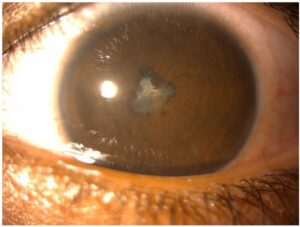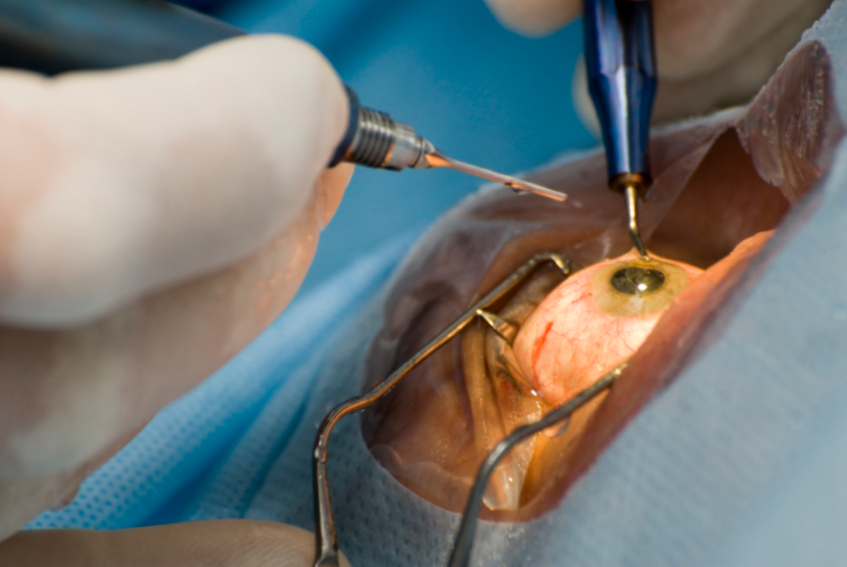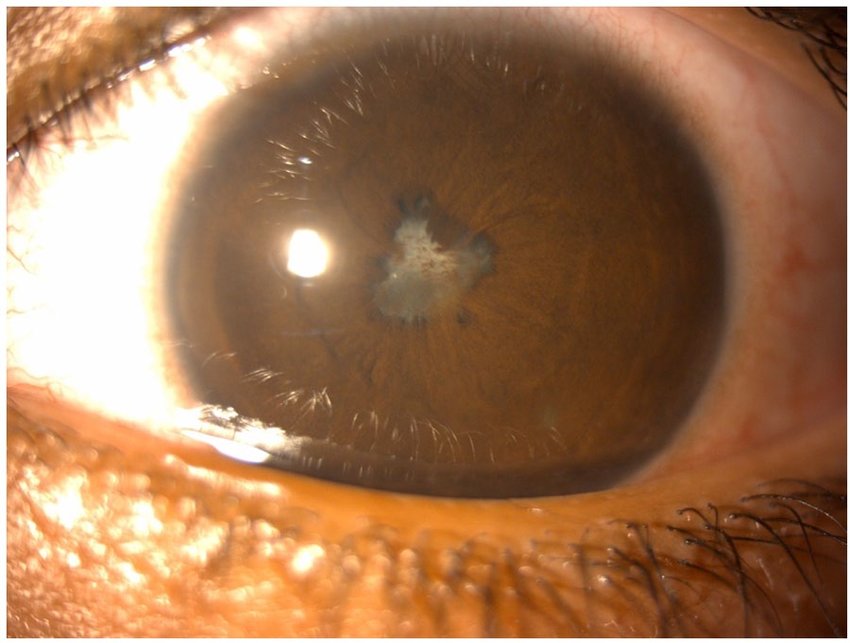If you have been told by your doctor that you have a complicated cataract, it is important to learn as much as you can about the condition. A cataract is a clouding of the lens in the eye, and when it becomes complicated, it can be difficult to treat. In this blog post, we will discuss the different types of complicated cataracts and what treatment options are available. We will also provide advice on how to best care for yourself if you are diagnosed with this condition.
What Are Complicated Cataracts?

Severe cataracts can sometimes cause the formation of new, smaller cataracts around the original one. These are called secondary cataracts, and they can make your vision even more blurry.
While most cataracts form gradually and don’t usually threaten your eyesight, complicated cataracts can cause severe problems if left untreated. You may need to see an eye specialist for treatment if you have a complicated cataract.
Complex cataracts can also cause the formation of new, smaller cataracts around the original one. These are called secondary cataracts, and they can make your vision even more blurry. Most people with complicated cataracts will need to have surgery to remove the cloudy lens and replace it with a clear artificial lens. In some cases, you may need more than one surgery to treat your condition.
If you have a complicated cataract, it’s important to see an eye specialist for treatment. With early diagnosis and treatment, you can help preserve your vision and prevent serious complications.
Signs of Complicated Cataracts

There are many signs of complicated cataracts. The most common symptom is decreased vision. Other symptoms include:
Glare and Halos Around Lights
This is one of the signs of a complicated cataract. When you have this symptom, you may find it difficult to drive at night or to read in low light. Sometimes, the glare and halos can be so severe that they interfere with your vision during the day.
Double Vision
Another symptom of a complicated cataract is double vision. This can happen when the cataract affects both eyes. Double vision can also be caused by other eye conditions, so it’s important to see an eye doctor if you experience this symptom.
Eye Pain or Pressure
If you have a complicated cataract, you may also experience eye pain or pressure. This symptom is often caused by inflammation in the eye. If you experience this symptom, it’s important to see an eye doctor so that he or she can determine the cause of the pain or pressure.
Changes In Color Perception
If you have a complicated cataract, you may also notice changes in your color perception. This symptom is often caused by the yellowing of the lens. If you experience this symptom, it’s important to see an eye doctor so that he or she can determine the cause of the change in color perception.
Changes In Color Vision
If you develop cataracts, you may notice that colors seem faded. You may also have trouble distinguishing between similar colors, such as blue and purple. Color vision also changes as we age, so this symptom may not be due to cataracts. If you experience this symptom, it’s important to see an eye doctor so that he or she can determine the cause of the change in color vision.
Poor Night Vision
So the final sign of complicated cataracts again has to do with your vision at night. You may find it difficult to see in low light or at night. This symptom is often caused by the yellowing of the lens. If you experience this symptom, it’s important to see an eye doctor so that he or she can determine the cause of your poor night vision.
Frequent Changes In Eyeglass or Contact Lens Prescription
Another sign of a cataract is a need for frequent changes in your eyeglass or contact lens prescription. This symptom is often caused by the yellowing of the lens.
Redness of the Eye
An increase in the redness of the eye can also be a sign of a cataract. This symptom is often caused by inflammation in the eye. If you experience this symptom, it’s important to see an eye doctor so that he or she can determine the cause of the redness.
Sensitivity To Light
If you have a cataract, you may also find that you are sensitive to light. This symptom is often caused by the yellowing of the lens. Sensitivity also changes as we age, so this symptom may not be due to cataracts. If you experience this symptom, it’s important to see an eye doctor so that he or she can determine the cause of your sensitivity to light.
If you experience any of these symptoms, it’s important to see an eye doctor. An eye doctor can perform a comprehensive eye exam to determine if you have a cataract and to rule out other conditions that could cause these symptoms.
Reasons for Complicated Cataract

Many reasons can lead to the development of a complicated cataract. The most common reason is due to previous eye surgery. Other causes include:
Injury to The Eye
One of the main reasons that can cause a complicated cataract is an injury to the eye. This could be due to a car accident, a fall, or any other type of trauma. These injuries are often the cause of a concussion, which can then lead to the development of a cataract.
Disease
Certain diseases can also lead to the formation of a complicated cataracts. These include diabetes, hypertension, and glaucoma. If you have any of these conditions, it is important to be monitored closely by your doctor to ensure that a cataract does not develop. There may also be other diseases that can cause a cataract, so it is always best to consult with your doctor if you are concerned about this possibility.
Age
As we age, our bodies change, and our risk of developing certain conditions increases. This includes the development of a cataract. If you are over the age of 60, you have a greater chance of developing this condition. However, it is important to note that cataracts can develop at any age. Sometimes, the cause of a complicated cataract is unknown. This is referred to as an idiopathic cataract.
Inflammation
Inflammation of the eye is another possible cause of a complicated cataract. This could be due to an infection or another condition that causes inflammation. If you experience any pain, redness, or swelling in your eye, it is important to see your doctor right away.
Impacts of Complicated Cataract
There are several impacts that a complicated cataract can have on a person’s life. The most obvious is vision loss. This can impact every aspect of a person’s life, from their ability to drive to be able to read and write. Additionally, it can make it difficult to perform everyday tasks, such as cooking or cleaning. In severe cases, it can even lead to blindness.
Another potential impact of complicated cataracts is pain. While not all people with this condition experience pain, for those who do, it can be debilitating. It may make it difficult to sleep or concentrate on anything else. Additionally, the pain may worsen over time if the condition is left untreated.
Finally, having a complicated cataract can also impact a person’s mental health. The anxiety and stress that comes with vision loss can be overwhelming. Additionally, the social isolation that often accompanies this condition can lead to depression (You can take online depression counseling). If you are struggling with your mental health, it is important to reach out for help. There are many resources available to help you cope with the challenges of living with a complicated cataract.
How To Diagnose Complicated Cataracts?
Diagnosing complicated cataracts can be difficult. Your doctor will need to take a thorough medical history and perform a comprehensive eye examination. They will also need to rule out other possible causes of your symptoms. In some cases, further testing may be required.
Visiting your eye doctor for regular check-ups is the best way to catch cataracts early. If you are experiencing any vision changes, make sure to schedule an appointment with your doctor right away. Early diagnosis and treatment can help prevent complications and preserve your vision.
When the diagnosis is confirmed, your doctor will discuss treatment options with you. In most cases, surgery is the only effective treatment for cataracts. Depending on the severity of your cataract, you may need to have one or both eyes operated on.
Treatment of Complicated Cataract

There are many ways to treat cataracts, but the most common is surgery. Complicated cataract surgery may require special techniques and/or equipment. Your doctor will determine the best way to treat your particular case. In some cases, more than one type of surgery may be needed.
Cataract Surgery
Cataract surgery is usually done on an outpatient basis, which means you can go home the same day. The surgeon will make a small incision in your eye and then remove the cloudy lens. Once the lens is removed, the surgeon will usually place a new artificial lens called an intraocular lens (IOL).
Most people who have cataract surgery experience improved vision afterward. However, it’s important to keep in mind that cataract surgery is not perfect and you may still need to use glasses or contact lenses for some activities.
Lenses
A cataract is a clouding of the natural lens of your eye. The lens is located behind the iris (the colored part of your eye) and functions much like the lens of a camera. It helps focus light onto the retina, which is the layer of tissue at the back of your eye that converts light into electrical impulses that are sent to your brain.
As we age, our lenses become less transparent and begin to absorb more blue light. This causes our vision to deteriorate and makes it more difficult to see both up close and far away.
Intraocular Lenses (IOLs)
An intraocular lens (IOL) is a clear plastic lens that is implanted in your eye during cataract surgery. IOLs are permanent and cannot be felt or seen once they are in place.
IOLs replace the natural lens that has been removed during cataract surgery. There are different types of IOLs, and your doctor will help you choose the best one for you based on your individual needs.
How To Prevent Complicated Cataracts?
Preventing complicated cataracts is possible by:
Wearing sunglasses that offer UV protection
One of the most important ways to prevent complicated cataracts is to wear sunglasses that offer UV protection. This will help to keep the sun’s harmful rays from damaging your eyes. When you are outdoors, make sure to wear sunglasses that have a label that says they offer 100% UV protection.
Limiting your exposure to sunlight
Another way to prevent complicated cataracts is to limit your exposure to sunlight. If you are going to be outdoors for an extended period, make sure to wear a hat or visor to protect your eyes from the sun.
Quit smoking
If you smoke, one of the best things you can do for your overall health is to quit. Smoking is a leading cause of many health problems, including complicated cataracts. If you are having trouble quitting, many resources are available to help you, including nicotine replacement therapy and counseling.
Eat a healthy diet
Eating a healthy diet is important for many reasons, including preventing complicated cataracts. Foods that are rich in antioxidants, such as fruits and vegetables, can help to protect your eyes from damage. Other foods that are good for eye health include fish, nuts, and seeds.
Get regular eye exams
Another way to prevent complicated cataracts is to get regular eye exams. This will allow your eye doctor to catch any problems early and treat them before they become more serious. If you have a family history of cataracts, you may need to start getting exams at an earlier age.
These are some of the tips to prevent complicated cataracts. But, if you already have a cataract, there are still options available to help improve your vision.
Conclusion
Seeking treatment for a complicated cataract is nothing to be ashamed of. It’s quite the opposite. By getting help from a professional, you’re taking charge of your eye health and ensuring that you’ll be able to see clearly for years to come. If you think you may have a complicated cataract, don’t hesitate to reach out to an eye specialist near you.
With their help, you can get your vision back on track. There are few things more important than your eyesight, so don’t wait to get the help you need. No matter how your complicated cataract forms, seeking treatment is essential for maintaining clear vision. If left untreated, a cataract will eventually cause complete blindness. But with prompt diagnosis and treatment from an eye specialist, you can keep your vision sharp for years to come.
Cataract surgery is a safe and painless procedure. At EyeMantra we have a team of experienced eye surgeons, who will be happy to answer your questions on cataract surgery, cataract surgery cost, and cataract lens cost for different cataract surgery types- Phacoemulsification, MICS & Femto Laser Cataract. Call us at +91-9711116605 or email at [email protected] for inquiries.


